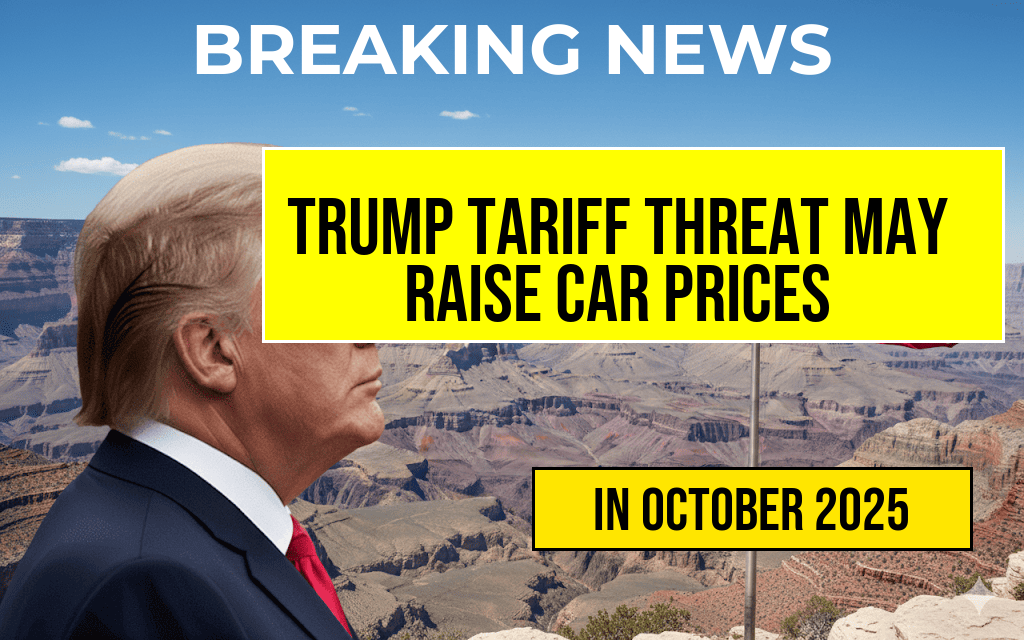Automakers and consumers alike face a potential shift in vehicle pricing as recent signals from the Trump administration suggest the possibility of renewed tariffs on imported automobiles and auto parts. If implemented, these tariffs could significantly inflate vehicle costs, with estimates indicating an increase of up to $5,286 per vehicle. Industry analysts warn that such tariffs could ripple through the supply chain, raising prices for new cars across various segments and impacting affordability for American buyers. The threat of tariffs, combined with ongoing trade tensions, underscores a period of uncertainty in the automotive market, prompting both manufacturers and consumers to scrutinize the potential financial implications.
Background on Tariffs and Automotive Imports
Trade policies have long influenced the automotive industry, which relies heavily on global supply chains. The U.S. imports a substantial portion of its vehicles and auto parts, particularly from countries like Japan, Germany, and Mexico. Historically, tariffs have been used as bargaining tools or protectionist measures, but their resurgence can disrupt established market dynamics.
Under the Trump administration, tariffs on steel and aluminum led to increased manufacturing costs, which automakers often passed on to consumers. Now, renewed threats target the import of finished vehicles and auto components, potentially adding tariffs that could reach 25% on certain imports, depending on the scope of the policy.
According to industry estimates, these tariffs could push up the average price of a new car by roughly $1,200 to $5,286. The extent of this increase hinges on factors such as vehicle size, brand, and the proportion of imported parts involved in manufacturing.
Projected Impact on Vehicle Prices
| Tariff Rate | Average Price Increase | Potential Maximum Increase |
|---|---|---|
| 10% | $500 | $1,286 |
| 15% | $1,200 | $3,857 |
| 25% | $2,500 | $5,286 |
These figures suggest that consumers could see substantial hikes, especially if tariffs reach the higher end of the spectrum. The additional costs are likely to be absorbed by automakers initially but may eventually be passed on to buyers through higher sticker prices, especially in competitive segments where profit margins are slim.
Industry Response and Market Outlook
Major automakers have expressed concern over the potential tariffs, emphasizing the risk of increased costs and reduced competitiveness. Many industry leaders argue that such tariffs could slow the recovery of the auto market, which has already faced disruptions from supply chain issues and shifting consumer preferences.
Automakers such as Ford, General Motors, and Toyota have cautioned that higher import tariffs could lead to less affordable vehicles and potentially stifle innovation by diverting resources away from technological advancements like electric vehicles and autonomous driving systems.
On the other hand, trade advocates maintain that tariffs could protect domestic manufacturing and preserve jobs, though critics warn that such protectionist policies often lead to higher prices and reduced consumer choice.
Consumer and Market Implications
For consumers, the threat of increased vehicle costs could influence purchasing decisions, prompting some to delay or reconsider new car purchases. Used vehicle markets might also experience shifts, as higher new car prices could push buyers towards pre-owned options.
Dealerships are closely monitoring developments, preparing for potential inventory adjustments and price changes. The timing of tariff implementation remains uncertain, but automotive retailers are bracing for possible disruptions in supply and pricing strategies.
Broader Economic Considerations
Beyond individual vehicle pricing, higher tariffs could impact the broader economy by elevating costs for auto manufacturers, suppliers, and related industries. Increased vehicle prices may also influence inflation metrics and consumer spending patterns.
Trade experts suggest that heightened tensions and the possibility of retaliatory tariffs from trading partners could complicate efforts to stabilize market conditions. As the Biden administration reviews trade policies, industry stakeholders await clearer guidance on the trajectory of tariffs and their potential scope.
For more on the intricacies of international trade and tariffs, visit Wikipedia’s Trade Policy page.
While the future remains uncertain, consumers and industry players are advised to consider the potential financial impacts of renewed tariff threats and to stay informed through reputable sources such as Forbes and official government announcements.
Frequently Asked Questions
What is the main concern regarding Trump’s tariff threat on new cars?
The primary concern is that tariff threats could lead to an increase in vehicle prices by up to $5,286, making new cars more expensive for consumers.
How might tariffs affect the overall cost of new cars in the market?
Tariffs on imported components and vehicles can raise manufacturing costs, which are often passed on to consumers, resulting in higher car prices.
Which car buyers are most likely to be impacted by these price increases?
Potential car buyers looking for new vehicles may face increased costs, especially those interested in imported cars or models that rely on international parts.
Could tariff threats lead to changes in car manufacturing or supplier strategies?
Yes, manufacturers and suppliers might adjust their sourcing and production plans to mitigate the impact of tariffs, potentially affecting vehicle availability and pricing.
What can consumers do to prepare for potential price hikes due to tariff threats?
Consumers can consider purchasing new cars sooner rather than later, explore alternative models, or look into used vehicles to avoid potential cost increases.

Leave a Reply